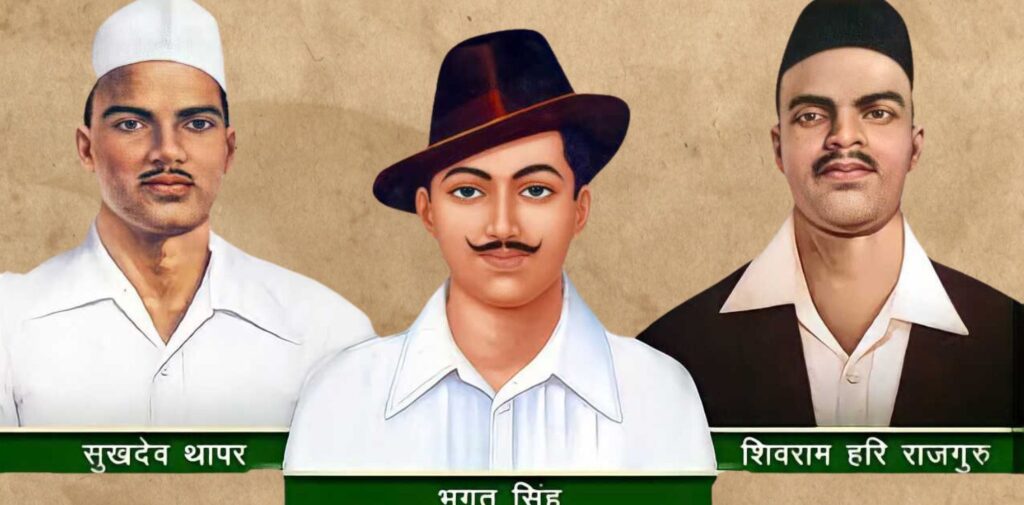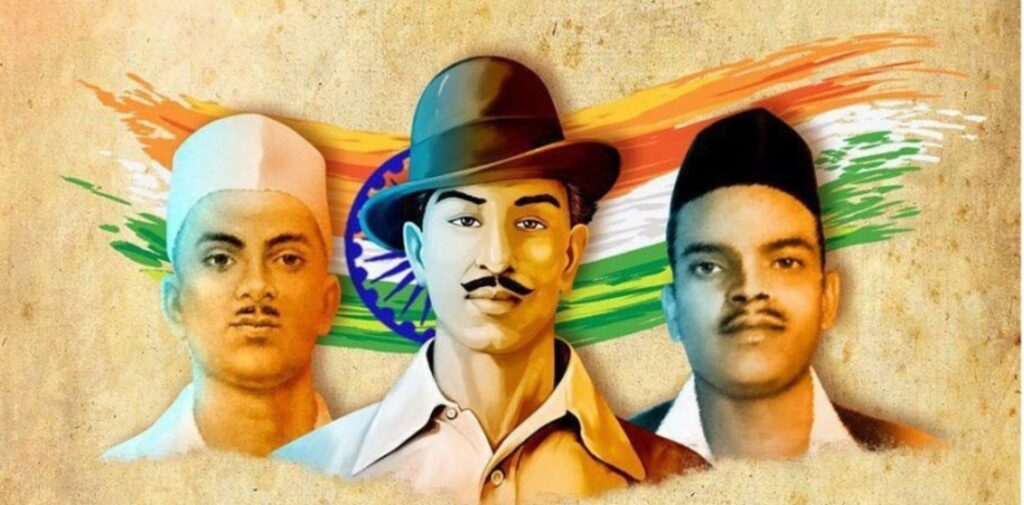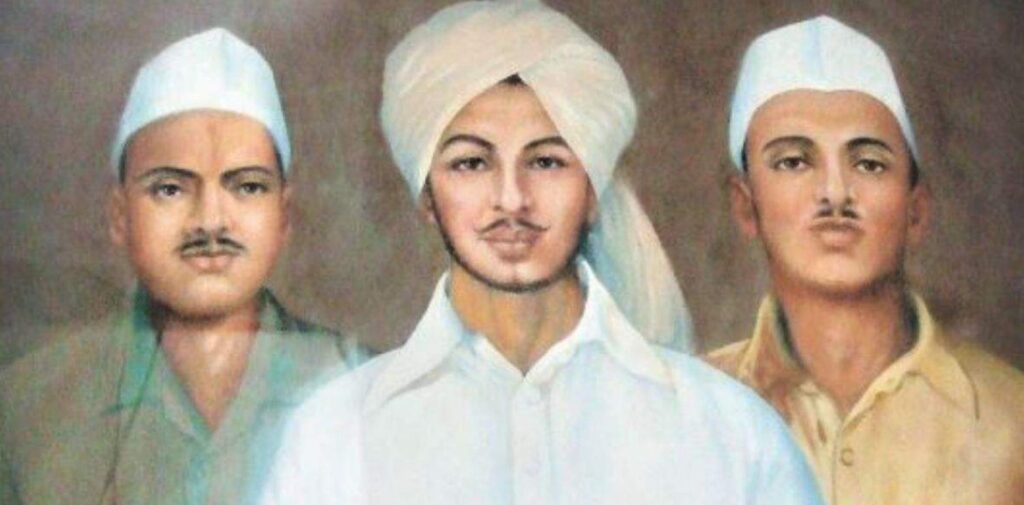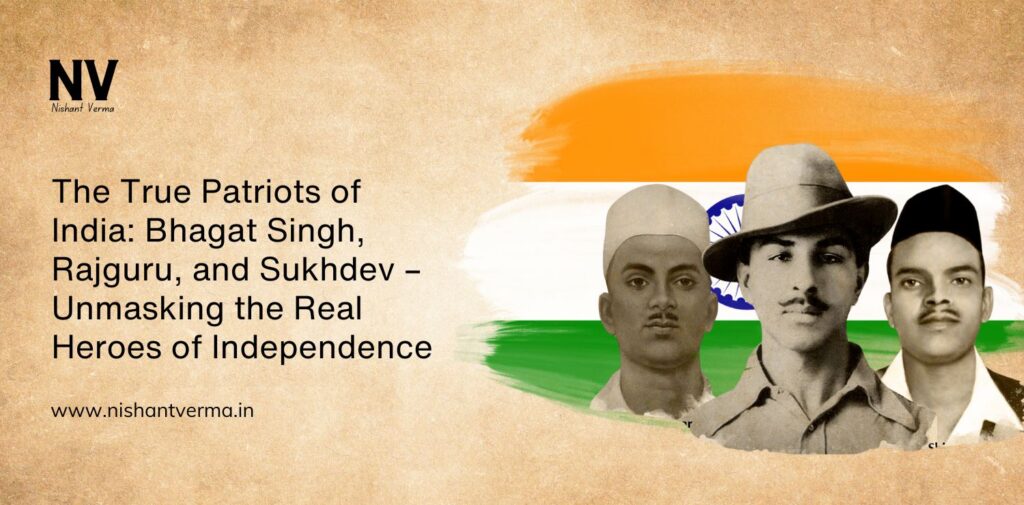As we commemorate another year of India’s independence, it’s time we revisit the stories of those who laid down their lives for the freedom we now enjoy. Among the countless heroes who fought against the British Raj, few names resonate as deeply as Bhagat Singh, Shivaram Rajguru, and Sukhdev Thapar. These young revolutionaries are often misrepresented or their sacrifices undermined by narratives that overshadow their contributions to India’s struggle for freedom. However, these three patriots were far more than mere victims of British oppression—they were the embodiment of courage, defiance, and the undying spirit of resistance against colonial rule.
Early Lives: The Making of Revolutionaries
Bhagat Singh, born on September 28, 1907, in a small village in present-day Pakistan, was deeply influenced by the political atmosphere of his time. His family was actively involved in the freedom struggle, with his uncle Ajit Singh being a well-known freedom fighter. From an early age, Bhagat Singh was exposed to the ideas of nationalism and revolution, which set the foundation for his future as one of India’s most iconic revolutionaries.
Shivaram Rajguru, born on August 24, 1908, in a small town near Pune, was drawn to the independence movement as a young boy. Like Bhagat Singh, he was deeply influenced by the atrocities committed by the British against his fellow countrymen. Rajguru’s desire to fight against these injustices led him to join the Hindustan Socialist Republican Association (HSRA), where he would later cross paths with Bhagat Singh and Sukhdev.
Sukhdev Thapar, born on May 15, 1907, in Ludhiana, was another ardent nationalist from an early age. His family background and the oppressive colonial environment around him fueled his passion for the freedom struggle. Sukhdev was known for his strong organizational skills, which he used to mobilize youth in the fight against British rule. He, too, became a member of the HSRA and was instrumental in many revolutionary activities.

The Formation of the Hindustan Socialist Republican Association (HSRA)
The trio of Bhagat Singh, Rajguru, and Sukhdev became key members of the Hindustan Socialist Republican Association, a revolutionary organization committed to overthrowing British rule through direct action. The HSRA, unlike the more moderate Indian National Congress, believed that independence could only be achieved through armed struggle. This was a stark contrast to the non-violent approach advocated by leaders like Mahatma Gandhi, who believed in peaceful civil disobedience.
The HSRA was formed by merging several revolutionary groups, and it was driven by a socialist ideology that aimed not only to rid India of British rule but also to establish a society free of exploitation. Bhagat Singh, Rajguru, and Sukhdev played crucial roles in shaping the organization’s strategies and executing its operations. They were not mere foot soldiers; they were the brains behind many of the HSRA’s most daring acts.
The Saunders Assassination: A Bold Statement of Defiance
One of the most significant events that cemented Bhagat Singh, Rajguru, and Sukhdev’s status as revolutionary heroes was the assassination of British police officer John Saunders in 1928. This act was a direct response to the death of Lala Lajpat Rai, a prominent nationalist leader who had been severely beaten by the police during a peaceful protest against the Simon Commission. Lala Lajpat Rai’s death left the nation in shock, and the HSRA decided to take matters into their own hands.
Bhagat Singh, Rajguru, and Sukhdev meticulously planned and executed the assassination of Saunders as an act of vengeance for Rai’s death. The killing of Saunders was not just an act of retaliation; it was a symbolic statement against the oppressive British regime. It demonstrated that the revolutionaries were willing to go to any lengths to avenge the wrongs done to their countrymen and that the British were not invincible.
The assassination was carried out with precision, but it was not without consequence. The British authorities launched a massive manhunt for the culprits, leading to the arrest of several members of the HSRA, including Bhagat Singh, Rajguru, and Sukhdev. The trio knew that their capture was inevitable, but they accepted their fate with the knowledge that their actions would inspire countless others to join the fight for freedom.

The Assembly Bombing: Making a Statement Without Bloodshed
Following the Saunders assassination, Bhagat Singh and his comrades continued their revolutionary activities. One of their most famous acts was the bombing of the Central Legislative Assembly in Delhi on April 8, 1929. This time, however, their intention was not to take lives but to make a statement. Bhagat Singh and Batukeshwar Dutt, another HSRA member, threw non-lethal bombs into the assembly chamber while shouting slogans of “Inquilab Zindabad!” (Long Live the Revolution!) and distributing pamphlets that outlined their demands and ideology.
The bombing was designed to make the British government and the Indian public aware of the revolutionaries’ cause. Bhagat Singh and Dutt deliberately allowed themselves to be arrested, knowing that their trial would give them a platform to spread their message. The trial was widely covered in the media, and Bhagat Singh used it as an opportunity to articulate the HSRA’s vision for a free and just India. His eloquence and passion won him widespread admiration, and he became a household name across the country.
The Trial and Execution: Martyrs for a Free India
The trial of Bhagat Singh, Rajguru, and Sukhdev, known as the Lahore Conspiracy Case, was a turning point in India’s freedom struggle. The British authorities were determined to make an example of them, and the trial was conducted with a clear bias against the accused. Despite the unfair proceedings, Bhagat Singh, Rajguru, and Sukhdev remained unflinching in their resolve.
During the trial, Bhagat Singh famously declared, “It is easy to kill individuals but you cannot kill the ideas. Great empires crumbled while the ideas survived.” These words encapsulated the spirit of the revolutionaries, who believed that their sacrifice would ignite the flame of freedom in the hearts of millions.
On March 23, 1931, Bhagat Singh, Rajguru, and Sukhdev were hanged in Lahore Jail. Their execution was carried out in secret, and their bodies were mutilated and disposed of hastily, reflecting the British fear of the growing influence of these young martyrs. However, the British underestimated the impact of their deaths on the Indian populace. The trio’s martyrdom galvanized the nation, and they became symbols of the struggle against colonial rule.

Misrepresentation and the Unsung Heroes: Unveiling the True Patriots
Despite their monumental contributions, Bhagat Singh, Rajguru, and Sukhdev have often been misrepresented or overshadowed in mainstream narratives of India’s freedom struggle. While some leaders are celebrated as the faces of independence, the sacrifices of these revolutionaries are sometimes downplayed or mischaracterized. The narrative that they were mere victims or misguided youth does a grave injustice to their legacy.
In reality, Bhagat Singh, Rajguru, and Sukhdev were far more than martyrs—they were visionaries who understood the importance of both direct action and ideological clarity in the fight against colonialism. They were not victims; they were architects of resistance who challenged the might of the British Empire with their courage and intellect.
The narrative that paints them as violent or reckless fails to recognize the calculated and principled nature of their actions. Their decision to use force was not born out of a love for violence, but out of a deep commitment to justice and freedom. They understood that in the face of an oppressive regime that used violence to maintain control, armed resistance was sometimes the only way to make their voices heard.
The Legacy of Bhagat Singh, Rajguru, and Sukhdev: True Symbols of Patriotism
The legacy of Bhagat Singh, Rajguru, and Sukhdev is not just one of sacrifice, but one of inspiration for generations of Indians. Their lives and actions exemplify the true meaning of patriotism—putting the nation’s welfare above personal safety, challenging injustices, and fighting for a vision of India that is free, just, and equitable.
In a time when the freedom movement was dominated by calls for non-violence, these three young men dared to chart a different path. They showed that patriotism is not a one-size-fits-all concept but can take many forms. Their willingness to sacrifice their lives for the country’s independence without seeking recognition or reward makes them true heroes.
Their legacy also challenges us to question the narratives that dominate our understanding of history. While some figures are celebrated, others who made equally significant contributions are often relegated to the background. It is crucial to recognize and honor the full spectrum of those who fought for India’s independence, including those whose methods and ideologies may not align with the mainstream narrative.
Conclusion: Honoring the Real Heroes of India’s Independence
As we celebrate India’s independence, let us remember the true heroes who made it possible—Bhagat Singh, Rajguru, and Sukhdev. These young revolutionaries were far more than mere victims of British oppression; they were the brave souls who dared to dream of a free India and were willing to lay down their lives to make that dream a reality.
Their contributions to the freedom struggle were immense, and their legacy continues to inspire countless individuals to stand up against injustice and oppression. As we honor their memory, let us also strive to ensure that their stories are told with the respect and reverence they deserve.
In an era where the term “freedom fighter” is often used loosely, it is essential to recognize the true patriots who fought not for fame or power, but for the liberation of their country. Bhagat Singh, Rajguru, and Sukhdev represent the undying spirit of resistance and the unwavering commitment to justice that should be the true hallmark of patriotism.
On this Independence Day, let us not only celebrate the freedom we enjoy but also reflect on the sacrifices made by those who made it possible. Let us honor Bhagat Singh, Rajguru, and Sukhdev as the real heroes of India’s independence, and let their legacy inspire us to continue the fight for a just and equitable society.




